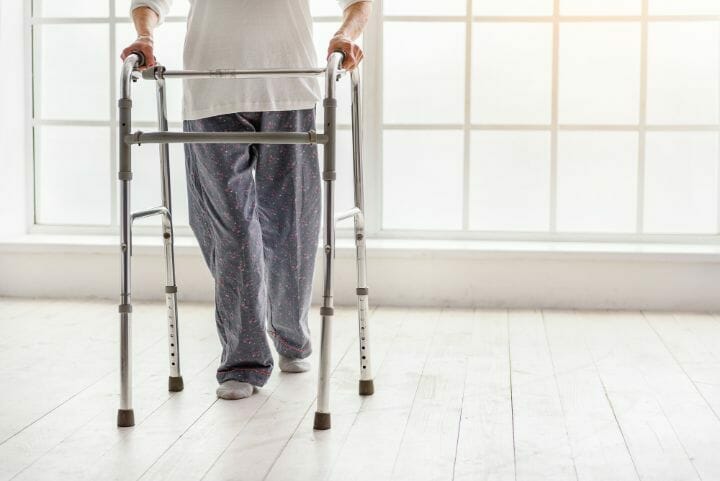The bravest of people sometimes get scared when they have to undergo a knee replacement procedure. After all, their mobility depends on it!
It is a relief to know that knee replacement surgeries are very safe and highly successful, being performed by specialists worldwide for decades. In this article, you will discover what needs to be done by the patient preoperatively. So let’s get started!
First, to determine whether knee replacement is the right option for you, your orthopedic surgeon will assess the range of motion, stability, and strength of your knee. Knee replacement surgery or knee arthroplasty is performed to replace the weight-bearing part of the knees.
It is done in severe cases such as osteoarthritis (painful swelling of the joints) when daily activities like sitting, standing, walking, and even folding of legs become very painful and difficult. When all other treatments fail to provide relief to the patient, surgery may be considered as the last resort.
Once you know you are getting this surgery done, all you need is to stay informed and prepare well for the procedure in the following ways:
Contents
Partial or Total Knee Replacement Surgery
There are two types of knee replacements: total knee replacement and partial. Total knee replacement surgery is a surgical procedure performed to replace the weight-bearing surfaces of the joint with metal and plastic components.
The goal is to relieve pain and improve function in patients with severe damage from arthritis or other causes. Partial knee replacement surgery will only replace damaged portions of the joint, avoiding some of the risks associated with total knee replacements such as infection, postoperative stiffness, and difficulty walking.
Preparing Mentally
Start Early Planning
Do not panic or get scared about your impending joint replacement surgery. Instead, try and keep your morale and spirits high by gathering relevant information and planning well.
Knowing how the knee replacement will affect your daily life till at least a few weeks after the surgery will make it easier to prepare and ensure a faster recovery period:
- Seek an appointment with your doctor and enquire about the surgery (details ahead). You can also gather more information about the procedure from reliable medical sites.
- Mark the date of your surgery on your calendar and start planning backward. Make a clear plan for all the days leading up to the day of the surgery. Sort out the days when you might need to go out shopping for daily essentials needed after the surgery and the other days when you need to give time to yourself for exercising, hospital visits, etc.
- You can also make a list of the supplies you may need for meals and other essentials and start gathering them yourself or with the help of a friend or family member.
- Fourthly, employing a house-help or a caretaker to assist you with daily chores after your joint replacement is also a great idea in this direction.
Preoperative Visit
This visit may be scheduled for you at least one week before the surgical procedure. When going for this visit, take the following documents:
- All documents related to your insurance coverage
- Past medical history records of any surgeries and any treatments undertaken
- Current medical history records of any illnesses or conditions such as diabetes, high blood pressure, anemia, etc.
- All medications presently taken along with their dosages and frequency
Getting Support Equipment in Place
Walkers and Crutches
You will need assistance to walk around post-surgery. Before going into surgery (at least two weeks before), get a good set of crutches or a walker for walking around at home.
This will serve as practice for using them after the surgery. Check the mobility aids beforehand for good condition and height adjustments.
Ride to and From
You may not be able to drive for a couple of weeks after the treatment. So, arrange for somebody to drive you to the hospital when you have to get admitted for the surgery and go back home on discharge. You can also keep the numbers of cab services handy and speak to them beforehand to schedule arrangements.
Preparing Medically
Medical Tests
Before surgery, the doctor assesses whether the patient is healthy enough to undergo treatment and evaluates risks if any. These checks include a complete blood screening, x-rays, blood pressure, ECG for checking cardiac functioning, respiratory history, and kidney and liver function tests.
Moreover, any infection in any part of the body needs to be negated before surgery, as any bacterial infection is an absolute contraindication for the surgery.
Routine stool and/or urine tests are also done. The patient needs to book these tests well in advance to have the tests done in time and follow the doctor’s guidance on the next steps.
Medications
Inform your doctor about all medications and pills currently being taken by you, including vitamins and nutritional supplements. This is necessary because you may need to stop taking medication or have it modified or titred as per the surgery.
Usually, anti-inflammatory medicines such as ibuprofen are stopped or decreased before the surgery. Corticosteroids, blood thinners, insulin, etc., have to be adjusted to different levels before and after the surgery.
Preparing Physically
Cut Down On Smoking and Alcohol Intake
You should prevent smoking and drinking for at least a week before the surgery and continue abstaining from it for at least the time you are on medications. Ideally, it is best to abstain until the healing is complete, as advised by your physician.
The nicotine in cigarettes delays the healing process and is known to make the wound more prone to infections. Moreover, alcohol is known to adversely react with any medications leading to side effects, and it also interferes with anesthesia.
Alcohol and smoking together cause a synergistic negative effect, when consumed together they increase the negative effects of each other.
Diet, Nutrition
A good diet before the surgery helps greatly in preparing the body and in healing uneventfully later. We have a separate article on a complete guide for healthy eating.
The diet should be high in protein and vitamins and well balanced. Try taking protein shakes and/or protein bars for preparing for joint replacement surgery. Avoid high-fat diets. The patient is also advised not to eat anything post-midnight on the day of the surgery.
Pre-Operative Exercises
Getting up and moving around plus doing some exercises for bone health will be more beneficial at this time than ever before. Getting into shape before surgery will greatly enhance the healing process of the body.
Losing weight, if overweight, will decrease the additional load on the knee joints. Upper body training for muscle strength can prepare the body to bear weight on the crutches after the surgery.
Deep breathing exercises will oxygenate the lungs more and increase healing. If the patient has limited mobility because of pain or any other reasons, a physician must be consulted to know all the exercises, such as running after a knee replacement procedure, that can help increase endurance.
Just Before the Surgery
Keep the Hospital Bag Ready
Keep a bag prepared with all essentials and spare items that may be needed at the hospital. The bag should at least have the following things:
- All medical and insurance documents
- Emergency phone numbers, photo id
- Phone, charger, and headphones
- Books etc. for idle time
- Few pajamas and robes or any comfortable clothes
- Toiletries, towels, spectacles, and other essential daily use items
- Pair of good walking shoes
- Crutches/ walker
Last-Minute Preparations
Speak to your doctor and strictly follow advice about all last-minute preparations. Take a bath before the surgery (as per instructions) and properly scrub the body. Cut long nails and remove nail paint. Remove all jewelry, make-up and contact lenses, etc.
Reach Out for Any Final Questions
Even after planning as per this elaborate list, if there are still some questions in your mind, do not hesitate to contact your physician to seek personal medical advice and remove any doubts about the procedure and pre-operative care.
Expect the Best but Take All the Precautions
Needless to say, when going into surgery, it is important also to know what could potentially go wrong. Though it is not a rule but an exception, it is in the patient’s best interest to prepare oneself because, like any other surgery, this one too carries certain risks.
Here are a few points the patient must take note of:
- Sepsis – sometimes, a bacterial infection occurs in the area of the treatment. To avoid the risk of sepsis, follow the antibiotic protocol as advised by the physician.
- Any other health issue you happen to note just before the surgery should be reported to the physician.
- Any sudden pain or discomfort just before the surgery should also be reported on time.
- If the hospital suggests any preoperative preparatory classes given by the hospital staff before the surgery, it is suggested to take these.
- Visit your dentist and take care of any dental pains and infections before going into surgery. Dental infections can also act as a potential source of infection later on.
- The day before surgery, follow all instructions given by the physician. You will also need to stop consuming anything after midnight.
- The night before, get to bed early and take a long, restful sleep as far as possible.
It is important to make the necessary appointments with a physiotherapist in advance for physical therapy and proper post-operative care and recovery.
Planning for the Home-Coming
Home Preparations
It is advisable to make all necessary changes around the house before going into surgery because these will be helpful when there is limited mobility later on. A few of the changes that can be done are:
- Keep the bed on the ground floor for easy access and avoid stairs.
- Clear unnecessary clutter in the room and obstacles such as electrical cords, rugs, etc. Make space for crutches or walkers that may be needed later.
- Make space for essential things such as phone, medicines, etc. at approachable hand-distance
- Stock up on groceries and other essentials around the house. See if you want to use a grocery delivery service.
- Grab bars or small rails (assistive support devices that are like handles and are fixed onto walls ) can be inserted near the toilet for easy sitting and getting up from the toilet seat and on stairways (if there is a need to use stairs). Grab bars can be put in the shower area, too, along with shower mats on the shower floor, to avoid slipping.
- Raised toilet seat – a toilet seat riser (an assistive device placed on the toilet seat to raise its height) can be installed on the toilet seat for easy toileting needs of the patient.
- A small stool can be placed in the bathroom to sit and take a bath.
- If stairs are inevitable in the house, make sure they have sturdy railings and anti-slip strips.
- Keep an ottoman or a bed stool in the room for raising the leg when necessary.
- Get the right chair or recliner to use after knee replacement.
- Keep some ice packs for knee replacement surgery ready in the fridge, which may be used later to settle down any swelling after the surgery.
- Look at you day-to-day routine that may require bending the knee. You can buy small aids like long shoehorns, sock aids, to make your life easier after knee replacement.
- If staying alone in the house, make arrangements for a friend or family member, or some temporary caregiver who can come over and stay with you. If not, check for special rehabilitation centers around where one may be able to stay later on.
- If self-cooking, you can get ready some batches of food and keep them in the fridge/freezer accordingly. Otherwise, you can subscribe to a meal delivery service.
- If you want to use the services of an out-patient therapist after the surgery, make necessary appointments with the same beforehand.
Takeaway
Knee replacement surgery has shown to have very positive long-term results and gives the patient a substantially improved quality of life.
Since it is an elective procedure, the big advantage is the fact that all preparations can be done meticulously in advance. So make use of this exhaustive list and prepare yourself for surgery and recovery confidently and with a relaxed mind.
If you are looking for more options on where to get the surgery done, read Knee Replacement Cost in India – Options for Foreigners.






